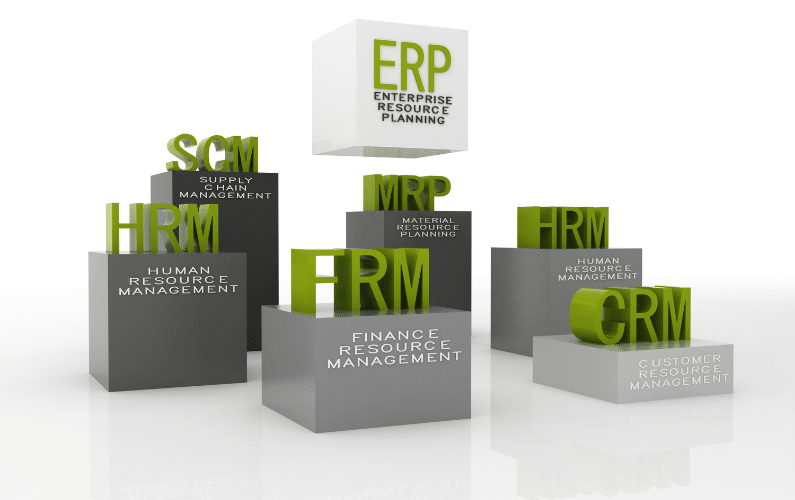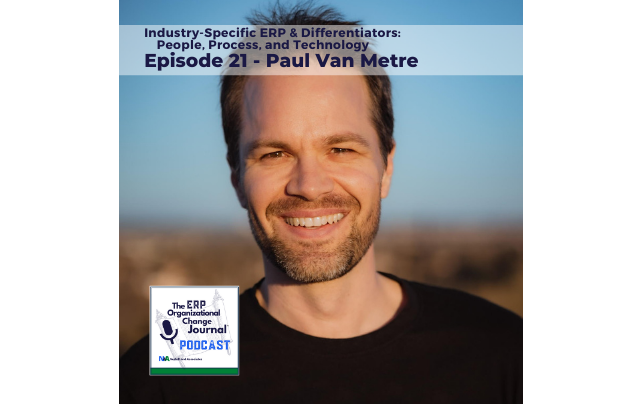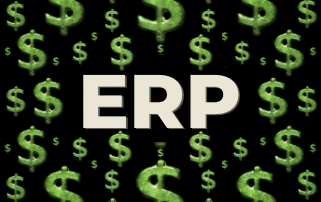- What is ERP Software and What Does It Do?
- What is an ERP System and What are the Benefits of Implementing an ERP system
- What Business Functions Benefit from ERP?
- Signs That You Need ERP
- How to Choose the Right ERP System for Your Business
- The Costs of Implementing an ERP System
- How to Get the Most Out of Your ERP System
What is ERP?
In general, the definition of ERP (Enterprise Resource Planning) is an integrated management of main business processes, often in real-time and mediated by software/technology.
What is ERP Software and What Does It Do?
ERP Software is a business process management software that allows an organization to use a system of integrated applications to manage the business and automate back-office functions.
The main purpose of ERP is to provide a single, centralized system that can be used by all departments within an organization, from accounting and finance to manufacturing and HR.
ERP systems are designed to save time and improve efficiency by streamlining processes and automating tasks.
In addition, ERP systems can provide insights into key business indicators, such as inventory levels and customer demand. By using an ERP system, businesses can gain a competitive edge by reducing costs and improving decision-making.
What is an ERP System and What are the Benefits of Implementing ERP Software
Businesses looking to improve their growth and efficiency should consider implementing an Enterprise Resource Planning (ERP) system. ERP systems help businesses by integrating all their information and processes into one system. This allows businesses to have a better overview of their data, which can lead to improved decision-making.
In addition, ERP systems can automate many business processes, which can free up time for employees to focus on other tasks. Overall, an ERP system can be extremely beneficial for businesses of all sizes.
What Business Functions Benefit from ERP Software?
ERP systems are designed to provide businesses with a comprehensive overview of their operations. By integrating data from various departments and locations, ERP systems give managers a clear picture of how the business is performing as a whole.
By integrating all aspects of the business into a single system, ERP can help to improve efficiency and accuracy. Common business functions that can benefit from ERP include accounting, inventory management, customer relationship management, and human resources.
In addition, ERP can also help businesses to streamline their supply chain and logistics operations. By automating key functions and improving communication between departments, ERP can help businesses to run more smoothly and efficiently. As a result, many businesses are implementing ERP to improve their overall operations.

Signs That You Need ERP Software
As a business owner, you know that change is essential for growth. But sometimes it can be difficult to know when it’s time to let go of the old and embrace the new.
When it comes to enterprise resource planning (ERP), there are a few telltale signs that it might be time for an upgrade.
- You’re still relying on manual processes, it’s time to switch to an automated system. Not only will this save you time and money, but it will also help to reduce errors.
- Second, if you’re struggling to keep track of inventory levels or customer data, an ERP system can help you to get organized.
- You are finding it difficult to make changes to your existing system. A new ERP platform can provide the flexibility you need.
- You’re losing customers due to order errors or long wait times. If your business is making too many mistakes or taking too long to fulfill orders, you’re going to start losing customers. An ERP system can help you streamline your processes and avoid errors.
- You’re struggling to keep up with the competition.
How to Choose the Right ERP Software for Your Business
Enterprise resource planning (ERP) systems are increasingly popular among businesses of all sizes. By integrating all aspects of a company’s operations, from accounting to inventory management, ERP systems can give businesses a real-time view of their performance. However, with so many different ERP systems on the market, choosing the right one for your business can be a daunting task.
Here are some tips to help you select the ERP system that best meets your needs:
- Define your business requirements. Before you even start looking at ERP systems, it’s important to have a clear understanding of your business needs. What processes do you need to automate? What type of data do you need to track? Answering these questions will help you narrow down the field of options.
- Look at the features each system offers. Some systems may have more functionality than you need, while others may be lacking in certain areas. Make sure to choose a system that offers the features you need without being overloaded with unnecessary bells and whistles.
- Consider scalability. As your business grows, you’ll need an ERP system that can scale with you. Make sure to choose an ERP system that offers the flexibility to add new users and modules as needed.
- Compare features and price. Once you’ve identified a few potential systems, it’s time to start evaluating them side by side. Look at the features each system offers and compare prices to find the best value for your company
- Make sure the system is configurable. An ERP system needs to be able to be configured to meet the specific needs of your business. Otherwise, you’ll likely end up with a lot of wasted time and money trying to make the system work for you.
- Pay attention to the user interface. The user interface is what your employees will use to interact with the ERP system daily. It needs to be intuitive and easy to use, or you’ll likely end up with frustrated employees who are resistant to using the system.
- Make sure the vendor has a good reputation. Don’t work with a vendor who doesn’t stand behind their product or provides poor customer service. Do your research and make sure you’re working with a vendor you can trust before making a purchase.
The Costs of Implementing an ERP System
Any business considering implementing an ERP system must first understand the costs involved. There are four main categories of costs to consider: hardware, software, services, and training.
Within each category, there are one-time costs and recurring costs.
- One-time hardware costs can include new servers or storage devices, while recurring hardware costs may include maintenance contracts or leasing fees.
- Software costs can be divided into license fees and support fees.
- Service costs can include consulting services or system integration.
- Training costs may include user manuals or on-site training for new employees.
By understanding all the costs associated with an ERP system, businesses can make informed decisions about whether or not to implement a particular system.
How to Get the Most Out of Your ERP System
ERP systems are designed to streamline business processes and improve efficiency. However, many companies fail to get the most out of their ERP system due to a lack of understanding of how the system works.
On The ERP Organizational Change Journal Podcast, we really like to ask our fellow colleagues and ERP practitioners how they define ERP. It seems like a straightforward question but the responses are interesting and tell us a lot. As you think about how to get the most out of your ERP system, think about how the two following quotes tell a similar story. *Note how Brett’s final point that people are the most important component of a business solution closely mirrors David’s sentiment:
“ERP is the software that helps run a business. It’s the technology piece that is wholly dependent on human behavior to make it work properly.”
David Ogilvie – David Ogilvie Consulting | Business Strategy Consultant, Independent ERP Expert
Another guest, David Beaubouef defines ERP this way;
“I look at ERP as deeply integrated best practice business support solution. Here are the drivers or that definition: Number one, integration trumps functionality in an ERP solution. A key competitive advantage of ERP is that it’s deeply integrated, and integration very much has an impact on the overall, ERP success. Number two, it’s the notion that business leads and technology supports. So, I know that in many sales pitches you might hear on ERP software, you’ll get the comment that ERP will help lead your business or drive your business. But technology never truly drives your business and it’s important to remember that business needs to lead and needs to help define the future and then ERP plays a supporting role in that solution. Three, when we talk about best practices we’re talking about common practices, not competitive practices. So, these are practices that are generally accepted by industry or companies as far as being as efficient as possible. Understanding that difference is important to better understanding what ERP is and what it is not. Finally, ERP is just one component of a business solution. You have the business processes, and you have the people; people most important component of a business solution and ERP technology supports business leads.”
Brett Beaubouef – Mastek | CISA, PMP, ERP Author
To get the most out of your ERP system, it is important to have a clear understanding of your business goals and how the system can help you to achieve those goals. And It is vital to have buy-in from the people in the organization. Creating cultures for successful ERP organizational change calls for a transformational leadership model.
It is also important to ensure that all employees are trained on how to use the system and that they understand the importance of entering accurate data. Furthermore, regular maintenance and updates are essential in order to keep the system running smoothly.
By following these tips, you can ensure that your company gets the most out of its ERP system.
Take Away
ERP systems can greatly benefit businesses of all sizes, but only if they are selected and implemented correctly. By understanding what an ERP system is, how to select the right one and how to get the most out of it, businesses can make sure that their investment in this technology pays off in terms of increased efficiency, profitability, and competitiveness.
If you’re ready to explore the world of ERP systems or need help researching your options, let us help you make that decision. We have years of experience researching and working with ERP systems and we want to share our expertise with you.
Seeing Any Signs that You are Ready for a New ERP?
Contact us today for a free consultation about your business’s needs and find out how an ERP system upgrade or new implementation could benefit.
Related Podcast Episodes
Related Articles
What Is The Best ERP For Small Business Applications?
By Nestell & Associates | June 30, 2022 | ERP Software Solutions
ERP Systems Have Long Been Associated With Large Businesses, But They Can Also Be Of Great Benefit To Small Businesses. The Right ERP System Can Help A Small Business Meet…
Why Should PE Firms Care About Objective ERP Selection?
By Jack Nestell | January 29, 2021
Why should PE firms care about proper, non-biased, objective, and vendor-neutral ERP partner and ERP System selection? Who would hire a chief financial officer (CFO) that doesn’t understand the business…
About Nestell & Associates
Merger and acquisition ERP digital transformations can be a significant challenge. But a solid framework is built on good practices with proven success. We have a successful track record with integrations, upgrades, mergers, and acquisitions, and we want to share our methods with you.
Our leadership experience in organizational change, information technology, ERP, and digital transformation crosses multiple industries.





